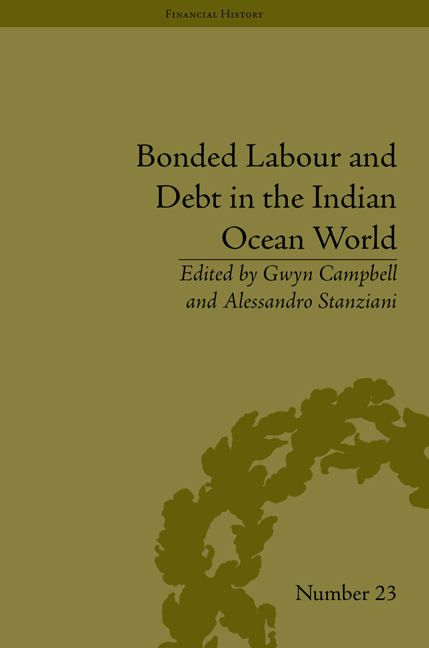Book contents
- Frontmatter
- Contents
- Acknowledgements
- List of Contributors
- Introduction
- 1 Debt and the Coercion of Labour in the Islamic Legal Tradition
- 2 Debt, Pawnship and Slavery in Nineteenth-Century East Africa
- 3 Debt and Slavery in Imperial Madagascar, 1790–1861
- 4 Credit and Debt in the Lives of Freed Slaves at the Cape of Good Hope: The Case of Arnoldus Koevoet, 1697–1735
- 5 Debt, Labour and Bondage: English Servants versus Indentured Immigrants in Mauritius, from the Late Eighteenth to Early Twentieth Century
- 6 Ransom, Escape and Debt Repayment in the Sulu Zone, 1750–1898
- 7 Debt and Slavery among Arabian Gulf Pearl Divers
- 8 The Political Economy of Debt Bondage in Contemporary South India
- 9 The Name of the Slave and the Quality of the Debt: When Slaves Are Not Debtors and Debtors Are Not Slaves in the Family Narrative of a Filipina Comfort Woman
- 10 Two Bonded Labour Emigration Patterns in Mid-Nineteenth-Century Southern China: The Coolie Trade and Emigration to Southeast Asia
- 11 Debt Slaves in Old Korea
- 12 The Debt-Servitude of Prostitutes in Japan during the Edo Period, 1600–1868
- Notes
- Index
6 - Ransom, Escape and Debt Repayment in the Sulu Zone, 1750–1898
- Frontmatter
- Contents
- Acknowledgements
- List of Contributors
- Introduction
- 1 Debt and the Coercion of Labour in the Islamic Legal Tradition
- 2 Debt, Pawnship and Slavery in Nineteenth-Century East Africa
- 3 Debt and Slavery in Imperial Madagascar, 1790–1861
- 4 Credit and Debt in the Lives of Freed Slaves at the Cape of Good Hope: The Case of Arnoldus Koevoet, 1697–1735
- 5 Debt, Labour and Bondage: English Servants versus Indentured Immigrants in Mauritius, from the Late Eighteenth to Early Twentieth Century
- 6 Ransom, Escape and Debt Repayment in the Sulu Zone, 1750–1898
- 7 Debt and Slavery among Arabian Gulf Pearl Divers
- 8 The Political Economy of Debt Bondage in Contemporary South India
- 9 The Name of the Slave and the Quality of the Debt: When Slaves Are Not Debtors and Debtors Are Not Slaves in the Family Narrative of a Filipina Comfort Woman
- 10 Two Bonded Labour Emigration Patterns in Mid-Nineteenth-Century Southern China: The Coolie Trade and Emigration to Southeast Asia
- 11 Debt Slaves in Old Korea
- 12 The Debt-Servitude of Prostitutes in Japan during the Edo Period, 1600–1868
- Notes
- Index
Summary
Introduction
In this essay, I examine the origin and relationship of debt and emancipation within the context of a flourishing captive exchange economy in the Sulu Zone. In the process of exchange and emancipation, former slaves or captives invariably accrued a level of indebtedness. This debt implied a shift in ‘master’ from the Sultanate to colonial officials, ships' captains or land owners who had arranged their redemption. In this context, Muslim and Spanish colonial traditions of servitude and forced labour meshed with the framework of emancipation as a direct consequence of either the act of ransom or escape. A system of transportation and de facto servitude was formed whereby the emancipated slave or former captive became part of a dependent colonial workforce. The indebted former slave then performed services for their new masters and produced material goods until the debt for the granting of their freedom and/or transportation was repaid. Slave trading and the acts of ransom and manumission provided labour resources, redistributed wealth and fostered kinship connections that helped to integrate seemingly antagonistic groups – despite these practices further encouraging cycles of violence and slave raiding. Set against this background, debt repayment, as a consequence of ransom, escape and/or transportation must be viewed as one of the corrosive effects of the slave trade on the inter-connected nature of Muslim and colonial societies in the Philippines.
- Type
- Chapter
- Information
- Bonded Labour and Debt in the Indian Ocean World , pp. 87 - 102Publisher: Pickering & ChattoFirst published in: 2014



